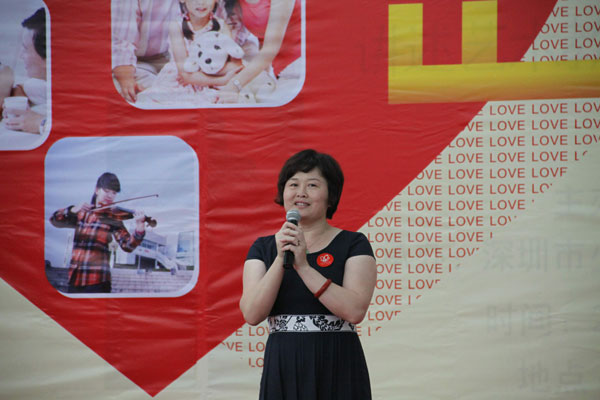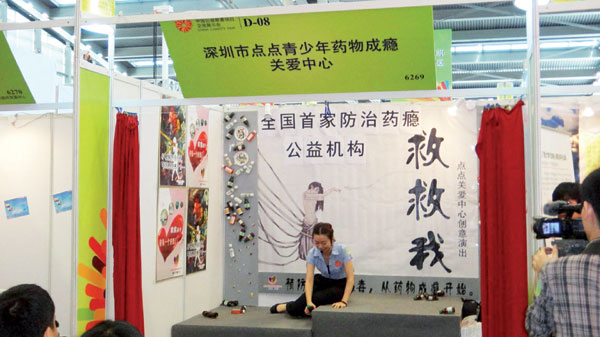
A high flyer in the corporate world quits her job to set up a center to help teenagers addicted to cough syrup. Huang Yuli reports in Shenzhen.
For nearly seven years, Zhou Lihui's son would extort money from her and threaten to commit suicide whenever she did not accede to his demands. Tan Deng was a cough syrup addict, who needed the money to feed his addiction.
 |
|
Zhou Lihui tells parents and teenagers about the dangers of cough syrup abuse at an event organized by the Dian Dian Teenage Drug Addiction Care Center. Photos by Huang Yuli / China Daily |
 |
|
Dian Dian Teenage Drug Addiction Care Center presents a play at Shenzhen Convention and Exhibition Center on July 12 during the China Charity Fair. |
Although the 21-year-old has kicked his habit, the horrible experience has prompted Zhou to set up the Dian Dian Teenage Drug Addiction Care Center, to publicize the dangers of cough syrup abuse, as well as to help teenage addicts and their families.
"It is safe to take the right dosage of cough syrups such as Anticol. If you take the recommended dosage, like 10 ml, three times a day, it's OK," says Zhou, 48, who has become an expert on the issue. "But if you drink a whole bottle (120 ml) or several bottles at a time, or mix it with soft drinks like Sprite or Cola, and continue drinking it for several days, you will get addicted. This applies to all cough syrups containing codeine."
Tan's addiction started when he was 13. It took Zhou several months to realize the seriousness of her son's addiction after he started borrowing money from classmates to buy cough syrup whenever Zhou refused to give him more money.
The situation spiraled out of control: After selling his cell phone, Zhou's son stole her cell phones, electrical appliances and furniture, and sold them.
"He became unreasonable whenever he was desperate for more cough syrup," Zhou says. "He knows he's the only child in the family and we could not bear losing him. So he started to threaten me and his dad that if we didn't give him more money, he would commit suicide," Zhou adds.
The heartbroken mother searched but could not find any rehabilitation center for cough syrup addicts. There are centers for other types of drug addicts but Zhou was reluctant to send him there because she was worried that he would mix with the wrong company in the center and turn to other drugs.
She found two hospitals in Guangzhou, which provided treatment and he was sent to one of them.
"He was rehabilitated at the hospital, but he went back to his old habits again when he was discharged. Codeine is just too easily available," Zhou says indignantly.
Though they are prescription medicines, codeine is easily obtainable at fruit or convenience shores, as well as from the Internet, she says. There are laws against drug dealers but not against illegal codeine peddlers.
Wang Xiangdong, chief of the supervision division at the Shenzhen Drug Administration, says it is a crime if an individual is found to be selling 50,000 yuan ($8,000) worth of codeine.
Zhou says, on reflection, both she and her husband should be blamed for their son's addiction. They were too engrossed in their careers. Zhou's husband was the CEO of a foreign enterprise while she was a senior manager. They divorced when the son was just a toddler and he was raised by 19 nannies, one after another.
"I think he resorted to cough syrups as a way to rebel against me and his father. It was a bitter lesson for us."
She decided to quit her job and moved with her son to the suburbs, devoting all her time and energy on him. Her ex-husband also got a less demanding job so that he could spend at least one day a week with Tan.
Sensing the commitment of his parents, Tan was determined to quit his habit. He asked to be admitted into an addiction treatment center again and stayed there for a month.
By the second half of 2010, he kicked his habit totally.
According to Xu Ying, deputy chief of the Shenzhen Association of Psychological Counseling and an instructor at Zhou's organization, combating physical addiction to codeine is easier than psychological addiction. "The quitting process needs support from the family and society, and for teenagers, the family plays the most important role. Many parents don't realize that," Xu says.
He adds that many addicts come from rich families. Their parents are professionals, government officials and entrepreneurs. These parents often have superficial relationships with their children. They are strict and do not spend sufficient time with their kids.
Over the past two years, Zhou's organization has distributed flyers to create public awareness. Together with a counseling institution, they offer treatment to both addicts and their parents.
One of the beneficiaries, Liu Dehui, has been off codeine for five months after undergoing treatment at Dian Dian.
"The counselor gave me hope, and I feel the care from my family. I decided to quit, though it was very hard," he says.
"Honestly, psychologically, I'm not off it yet. But I have faith that I will eventually. Nobody can help me with that. I've got to be strong myself."
For Zhou, her ultimate aim is to push for all errant codeine dealers to be punished.
"It is the hope of all addicts' parents to bring illegal cough syrup dealers to justice. We hope the government will enact a related law to save our children, our next generation," she says.
Contact the writer at [email protected].